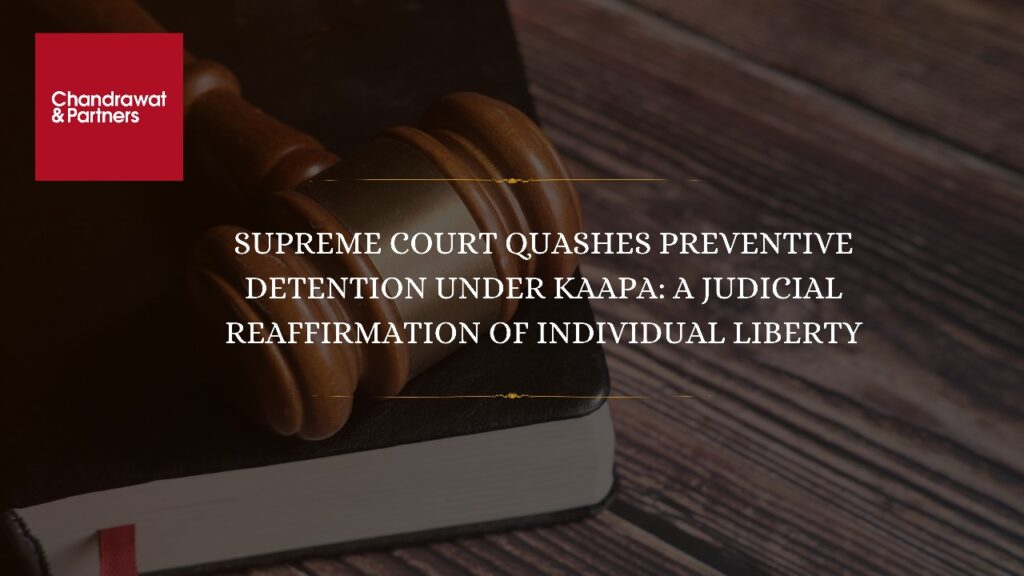Home > Recent Judgements > Supreme Court Quashes Preventive Detention Under KAAPA: A Judicial Reaffirmation of Individual Liberty
Jun 07, 2025
Supreme Court Quashes Preventive Detention Under KAAPA: A Judicial Reaffirmation of Individual Liberty
In a significant ruling that reinforces the fundamental tenets of constitutional liberty, the Supreme Court of India has quashed the preventive detention of a Kerala-based private moneylender under the Kerala Anti-Social Activities (Prevention) Act, 2007 (KAAPA). The apex court reiterated that preventive detention, though constitutionally permissible, remains an exceptional tool that must be invoked sparingly and only in the rarest of circumstances.
Background of the Case
The case concerned Rajesh, a private moneylender operating a registered lending firm under the name Rithika Finance in Kerala. On June 20, 2024, the District Magistrate issued a preventive detention order against him under KAAPA, which was later upheld by the Kerala High Court at Ernakulam on September 4, 2024.
The detention was challenged by Rajesh’s wife before the Supreme Court, arguing that the invocation of preventive detention was excessive and unjustified given the nature of the alleged offences.
Supreme Court’s Observations
A bench comprising Justices Sanjay Karol and Satish Chandra Sharma delivered the verdict on June 6, 2025, setting aside both the detention order and the Kerala High Court’s judgment. The court emphatically observed:
“It is well settled that the provision for preventive detention is an extraordinary power in the hands of the state that must be used sparingly. It curtails an individual’s liberty in anticipation of the commission of further offence(s), and therefore, must not be used in the ordinary course of nature.”
The bench cited Article 22(3)(b) of the Constitution, which provides for preventive detention laws, but clarified that this constitutional provision is not absolute and must be interpreted in the light of Article 21—the right to life and personal liberty.
In doing so, the court relied on precedent, particularly the ruling in Rekha v. State of Tamil Nadu (2011), where it was held that preventive detention is an exception to Article 21, and must be applied narrowly and with rigorous judicial scrutiny.
Legal and Constitutional Analysis
Preventive detention laws, including KAAPA, are designed to address threats to public order by detaining individuals likely to commit offences in the future. However, such laws are inherently preventive, not punitive, and pose a direct challenge to the fundamental rights enshrined in the Constitution.
Under KAAPA, individuals with a record of repeated offences may be detained to prevent further criminal activity. Yet, the invocation of the Act must satisfy stringent legal thresholds:
- The detained person must qualify as a “known rowdy” or “anti-social element” under the Act.
- There must be credible material indicating a real likelihood of future harmful conduct.
- The detention must be proportional and non-arbitrary.
The Supreme Court found that these conditions were not sufficiently met in Rajesh’s case. His activities, even if questionable under financial regulations, did not pose an imminent threat to public order or justify curtailing his personal liberty.
Judicial Emphasis on Liberty
The judgment reinforces the judiciary’s commitment to safeguarding personal liberty and ensuring checks and balances on executive action. It acknowledges the delicate balance between state interest in maintaining public order and the individual’s right to freedom.
Notably, the court emphasized:
- Preventive detention must not become a substitute for normal criminal law procedures.
- Detention cannot be used to bypass investigation, charge, and trial.
- The subjective satisfaction of the detaining authority must be supported by objective, compelling evidence.
Implications of the Verdict
This ruling serves as a landmark reaffirmation of constitutional safeguards in preventive detention matters. It is likely to influence:
- State authorities, who must now exercise greater caution and legal diligence before invoking preventive detention laws.
- Legal practitioners, who may use this precedent to challenge arbitrary detentions across jurisdictions.
- Judiciary, which is reminded of its vital role in upholding individual rights against state overreach.
Closing Thoughts on Preventive Detention and Judicial Oversight
The Supreme Court’s decision in quashing the preventive detention of Rajesh underscores a fundamental principle of constitutional jurisprudence: liberty is the rule, and preventive detention is the exception. While the state retains the power to preventively detain individuals in the interest of public order, this power must be exercised within the confines of legality, necessity, and proportionality.
As preventive detention laws continue to exist within India’s legal framework, the judiciary’s vigilance in scrutinizing their application remains critical to preserving the democratic fabric of the nation. This judgment is a compelling reminder that individual freedom cannot be sacrificed on speculative grounds, and that constitutional rights must prevail over administrative expediency.
For more information or queries, please email us at
enquiries@chandrawatpartners.com





